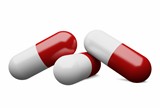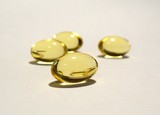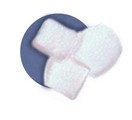Geliko Gelatine in Pharmaceutical Applications
Gelatine's many functionalities including...
· Film formation
· Adhesion
· Neutral taste and aroma
· Low allergenic potential
· Variable dissolution rate
...make it a versatile ingredient for many kosher pharmaceutical formulations.
Gelatine Capsules
 |
· Thermoreversible gelation
Gelatine- Coating for Tablets
 |
Gelatine-coated tablets are prepared using a special dipping process or by incorporation into premade hard or soft gelatine capsules.
Nutrient Encapsulation
Traditionally difficult-to-dose oil-soluble nutrients such as vitamin A, vitamin E, carotenoids, and polyunsaturated fatty acids (PUFA), can be converted into easily dosable, free-flowing powders using gelatine. Spray-drying an emulsion consisting of gelatine, sugar, and the oil-based active ingredient yields an easily handled dry material that is readily dispersible in water. These spray-dried nutrients are routinely used for multivitamin preparations, effervescent tablets, and other beverage products, and may also be compressed into tablets. Low-Bloom gelatins, 80-150 Bloom, are typically used for this application.
Nutraceuticals
There are observations and medical experiences on the positive effect of gelatine on skin, nails, hair and bones. Experimental findings and clinical studies carried out in the past two decades strongly suggest that gelatine hydrolysate may have a beneficial effect on joint health both in terms of prevention and therapy. Further studies have shown that osteoarthritis patients consuming gelatine hydrolysate experience significant pain reduction and subsequently, reduced consumption of analgesics.
Soft gelatine capsules are easy to swallow, and dissolve readily in the body, improving the bioavailability of the active substance. Special coatings provide resistance to gastric juices, allowing developers to specify the time required for capsule dissolution. Medium-Bloom gelatine, 150- 200 Bloom, is used for the production of soft gelatine capsules.
Spherical or tube-shaped capsules are ideal for products intended for topical application. The contents can be easily squeezed out. Special soft gelatine capsules have also been developed for suppository products.
 |
Sponges Wound
Soft gelatine capsules are manufactured using a simultaneous production and filling process referred to as the "rotary die process." Two bands of material containing 40 - 50% gelatine and 15-25% plasticizers are passed through counter-rotating dies. Precision pumps fill the liquid contents into the wells of the capsules via a heated filling wedge. The capsules are then sealed, washed, dried and, if desired, printed upon. A rotary die machine can produce 10,000 to 100,000 soft gelatine capsules per hour. The filling volume is between 60μl and 15ml. The capsules may also receive a coating that maintain capsule integrity through the stomach, and release active ingredients once they have reached the intestinal tract. Capsules may also be enhanced for products designed for chewable or lozenge-type applications.
Due to excellent compatibility with human tissue, gelatine is used in products designed for the treatment of wounds. Gelatine sponges are used routinely in dentistry and surgery to fill temporary cavities and top bleeding. Sponges made of pharmaceutical gelatine are fully absorbed by the body, and allow new cells to enter the wound, accelerating the healing process. If desired, antibiotics may be incorporated into gelatine sponges.
Specially tested pharmaceutical gelatine is dissolved in aqueous solution, aerated, carefully dried, cut, packed, and sterilized. High-Bloom gelatines, 200-260 Bloom, are used for the preparation of sponges.
| Main Menu |
|---|
